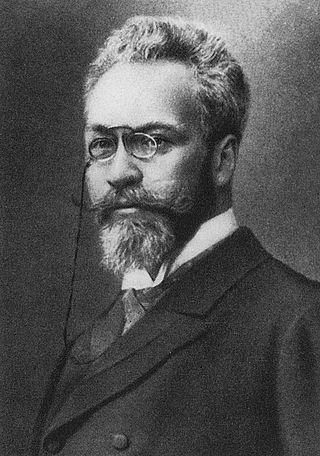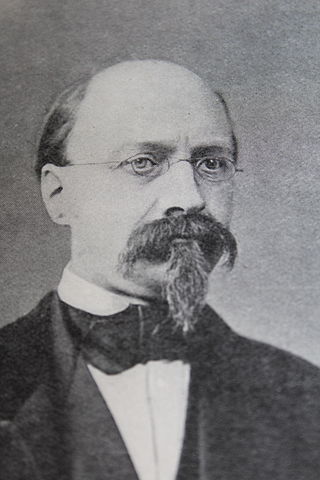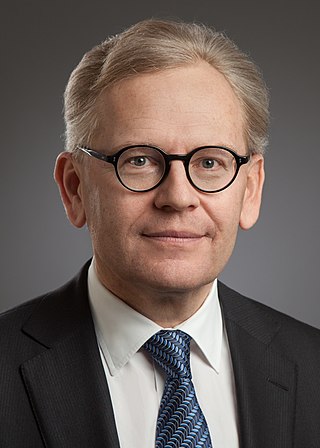
André Frédéric Cournand was a French-American physician and physiologist.
Jean Bernard was a French physician and haematologist. He was professor of haematology and director of the Institute for Leukaemia at the University of Paris. After graduating in medicine in Paris in 1926 he commenced his laboratory training with the bacteriologist Gaston Ramon at the Pasteur Institute in 1929.

Situated at 16 Rue Bonaparte in the 6th arrondissement of Paris, the Académie nationale de médecine was created in 1820 by King Louis XVIII at the urging of baron Antoine Portal. At its inception, the institution was known as the Académie royale de médecine. This academy was endowed with the legal status of two institutions which preceded it—the Académie royale de chirurgie, which was created in 1731 and of the Société royale de médecine, which was created in 1776.

The Minkowski Prize is given by the European Association for the Study of Diabetes (EASD) in recognition to research which has been carried out by a person normally residing in Europe, as manifested by publications which contribute to the advancement of knowledge concerning diabetes mellitus. The Prize honors the name of Oskar Minkowski (1858–1931), a physician and physiologist who was the discoverer of the role of pancreas in the control of glucose metabolism. It has been awarded annually since 1966, and the winner is invited to pronounce a Minkowski Lecture during the EASD Annual Conference. It is traditionally seen as the most prestigious European prize in the field of diabetes research.

Charles-Philippe Robin was a French anatomist, biologist, and histologist born in Jasseron, département Ain.

Anatole Marie Émile Chauffard was a French internist born in Avignon.

Léon Louis Rostan was a French internist and a member of the Académie Nationale de Médecine.
The European Association for the Study of Diabetes (EASD) is a scientific association founded in Montecatini Terme, Italy in 1965 with Joseph Hoet as Founding President. The aims of the association are to encourage and support research in the field of diabetes, the rapid diffusion of acquired knowledge in that field, and to facilitate its application.

Étienne Lancereaux was a French physician born in Brécy-Brières. He is remembered for pioneer contributions made in the understanding of diabetes.
John Andrew Todd FMedSci FRS is Professor of Precision Medicine at the University of Oxford, director of the Wellcome Center for Human Genetics and the JDRF/Wellcome Trust Diabetes and Inflammation Laboratory, in addition to Jeffrey Cheah Fellow in Medicine at Brasenose College. He works in collaboration with David Clayton and Linda Wicker to examine the molecular basis of type 1 diabetes.

David Rosenblatt is a Canadian medical geneticist, pediatrician, and professor in the departments of Human Genetics, Medicine, Pediatrics, and Biology at McGill University in Montreal, Quebec, where he was the chairman of the Department of Human Genetics from 2001 to 2013. He is known for his contributions to the field of inborn errors of folate and vitamin B12 metabolism.

Raymond Alexander Turpin, born 5 November 1895 in Pontoise, died May 24, 1988, in Paris, was a French pediatrician and geneticist. In the late 1950s, his team discovered the chromosomal abnormality, trisomy 21, responsible for Down syndrome.
Andrew Tym Hattersley CBE FRS is a Professor of Molecular Medicine at the University of Exeter and is known for his research in monogenic diabetes. He was elected a Fellow of the Royal Society in 2010. He is also an Emeritus Senior Investigator at the National Institute for Health and Care Research (NIHR).
Miriam Cnop is a Belgian researcher and physician specializing in diabetology. She is Professor of Medicine at Université Libre de Bruxelles and Clinical Director of Erasmus Hospital’s Endocrinology Department. She leads the ULB Center For Diabetes Research. Her work centered on type 2 diabetes, in particular mechanisms of lipotoxicity using human islets of Langerhans and human induced pluripotent stem cell-derived β Cells. She is an associate member of the Royal Academy of Medicine of Belgium. In 2013, her work was awarded the Oskar Minkowski prize from the European Association for the Study of Diabetes.
Chen Saijuan, also known as Sai-Juan Chen, is a Chinese hematologist and molecular biologist with a research focus on leukemia cytogenetics. She is a professor and Director of the State Key Laboratory of Medical Genomics at Shanghai Jiao Tong University School of Medicine, Director of the Shanghai Institute of Hematology, and Vice-Chairwoman of the Chinese Medical Association. She is an academician of the Chinese Academy of Engineering and The World Academy of Sciences, and a foreign associate of the French Académie Nationale de Médecine and the Royal College of Physicians of the UK. She has made important discoveries in the pathogenesis of leukemia and developed therapies to treat acute promyelocytic leukemia (APL) and other types of leukemia.

Jean-François Bach was a French medical professor, biologist and immunologist. He was Secrétaire perpétuel honoraire of the Académie des sciences. Bach died on 12 December 2023, at the age of 83.

Michael Roden is Professor and Chairman of Internal Medicine, Endocrinology and Metabolic Disorders at Heinrich Heine University Düsseldorf, Director of the Division of Endocrinology and Diabetology at the University Hospital of Düsseldorf and Spokesman for the Executive Board and Scientific Director of the German Diabetes Center, the Leibniz Center for Diabetes Research at the Heinrich Heine University Düsseldorf.

Anna L Gloyn is a geneticist, who is Professor of Pediatrics (Endocrinology) and Genetics at Stanford University. She was the recipient of the Minkowski Prize in 2014 for her research into causal mechanisms of diabetes pathogenesis. Her work has contributed to improved treatment options for people with rare forms of diabetes and helped advance our understanding of type 2 diabetes.
Helena Edlund is a Swedish professor and molecular biologist. She received her Ph.D. from Umeå University in 1991. She is a professor in Molecular Developmental Biology at Umeå University where she researches Type 2 diabetes and β-cell function. She is one of the founders, along with Thomas Edlund and Olof Karlsson, of the biopharmaceutical company Betagenon.
Hannele Yki-Järvinen is a Finnish endocrinologist, who specialises in non-alcoholic fatty liver disease (NAFLD) and the treatment of type 2 diabetes.












